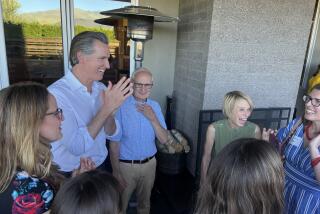Clinton Campaign Slows Its Rough and Tumble Pace : Democrats: The front-runner is focusing attention on domestic issues, where polls show the President is weakest.
- Share via
ONTARIO, Calif. — For now, the rough and tumble is over. The careening pace of Arkansas Gov. Bill Clinton’s run for the Democratic presidential nomination has slowed, fewer hands are shaken, fewer stops lined up on his schedule cheek by jowl.
As all front-running campaigns do in the late spring, Clinton’s has adopted a general election tone, its focus narrowed and its targets dispatched with greater discipline.
In recent days, Clinton has tried to inoculate himself against the so-called “wedge” issues used so effectively against Democrats in past elections. He has argued that President Bush’s embrace of “family values” was a coarse political calculation, and that he would better support families with maternal and child health care, more stringent child support programs and efforts to lead poor families off of welfare.
He has slammed Bush for using race as a divisive political tool, all but challenging the President to try to use welfare reform as a cover for dividing black voters from whites.
At the same time, Clinton has kept up a drumbeat of emphasis on the domestic side of the political agenda, where polls show Bush is weakest and Clinton perceives the advantage.
This week, much of his emphasis has been specifically directed to education, which looms as a huge interest in voters’ minds, particularly the baby-boom suburban voters that Clinton is seeking to attract.
Answering a question from a voter in Portland, Ore., on Wednesday, before he traveled to Ontario for an electronic “California town meeting,” Clinton invoked what has been a persistent criticism directed toward Bush, the only competition that Clinton bothers to target these days.
“I wake up in the morning obsessed with the things I just talked to you about,” he said, after talking about education, health care and the deficit. “The difference between me and President Bush is that I want to be a President who deals with these domestic problems.”
To make his points Wednesday, Clinton arranged to broadcast his views via satellite to 20 high schools around Oregon.
Clinton told the high school students that as President he would fully fund Head Start, demand smaller classes, emphasize science and mathematics and steer students into either college or apprenticeship programs.
Things went better Wednesday night, when Clinton sponsored an Ontario town meeting that was linked by satellite to similar gatherings in Sacramento, Hayward and Fresno.
There, Clinton promised to use his presidency to promote the discussion of AIDS. To highlight his interest, he said, he would ensure that someone infected with the AIDS virus will speak at the July Democratic National Convention.
Clinton also vowed to be a “consistent, concerned, involved spokesperson for racial harmony,” and said his Administration would reflect the racial diversity of America.
Throughout the day, as he has in the weeks since competition for the Democratic nomination wound down, Clinton sought to reintroduce himself to voters skeptical because of what he termed “bad and inaccurate publicity” in recent months.
Before dozens of college-age supporters who gathered outside the Portland Community College room where he filmed the high school program, Clinton characterized himself as an outsider who had battled entrenched interests.
“I’ve worked for 11 years, I’ve taken on every interest group you can imagine in my state,” he declared, ticking off past scuffles with Arkansas teachers, labor unions and the National Rifle Assn.
The major thrust of Clinton’s campaign week will occur today in East Los Angeles, where the Arkansas governor is due to deliver an education address. Later, he will return to Oregon, which holds its primary Tuesday, and where polls show Clinton with a slim lead over former California Gov. Edmund G. (Jerry) Brown Jr.
More to Read
Get the L.A. Times Politics newsletter
Deeply reported insights into legislation, politics and policy from Sacramento, Washington and beyond. In your inbox twice per week.
You may occasionally receive promotional content from the Los Angeles Times.











